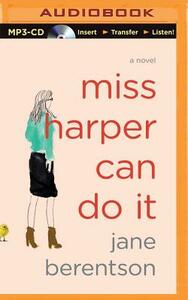Take a photo of a barcode or cover
I really enjoyed this original and imaginative book. The premise that it is the rough draft of the protagonist's first memoir (and sometimes diary), coupled with the footnotes, made it a step apart from the "norm." I also liked the honesty of Annie Harper - she doesn't sugar-coat how she really feels about her boyfriend being over in Iraq - she hates the war, is not fond of the fact that he's in the military, thinks W is an idiot, and gags over the saccharine sweetness of many of the "my husband is a war hero" blogs. All the things that probably many people feel, but are afraid to express because it's not "patriotic" and "PC."
While the love story was predictable, it unfolded in a nice and natural manner. The chicken was inspired (and the source of two "oh no" moments for me). I liked it a lot.
The only thing that I didn't like - and this book is by no means alone in this regard (unfortunately) is the amount of "fat hate" that takes place. It's the kind of thing that probably was totally unconscious, and goes largely unnoticed by most readers (because the last thing anyone wants to be is fat, good god!), but the several instances where fat is mentioned - even as a simple descriptive tool, it does so with completely negative connotations. Fat=bad. And that's too bad, because it really did mar my perception of the book (and author).
While the love story was predictable, it unfolded in a nice and natural manner. The chicken was inspired (and the source of two "oh no" moments for me). I liked it a lot.
The only thing that I didn't like - and this book is by no means alone in this regard (unfortunately) is the amount of "fat hate" that takes place. It's the kind of thing that probably was totally unconscious, and goes largely unnoticed by most readers (because the last thing anyone wants to be is fat, good god!), but the several instances where fat is mentioned - even as a simple descriptive tool, it does so with completely negative connotations. Fat=bad. And that's too bad, because it really did mar my perception of the book (and author).
It's rare that I find a voice in a novel that matches those of my friends and myself. Miss Annie Harper, as a narrator and wannabe memoirist, is irreverant, sarcastic, and at times befuddled by the orderly chaos of her life. If I lived her in fictional Tacoma world, I would probably try to be her friend. Her account of life in the US while her boyfriend is deployed in Iraq comes across as an authentic depiction of the non-flag waving faction of the homefront. She has her faults and confused moments, which only helped her to become more real for me.
My only minor problem with this semi-light and humorous read was the character Gus, Miss Harper's best friend. He appeared as valiant and noble as Mr. Willoughby initially does in the Emma Thompson movie version of Sense and Sensibility: I kept expecting him to pull out his own minature version of Shakespeare's sonnets and then run off to marry a rich, snobby girl.
Miss Harper Can Do It is not a groundbreaking literary piece, but rather an enjoyable, alternative look at those left behind when people are shipped off to war. The mundane, the kooky, and the relationships all make this a satisfying, somewhat girly read.
My only minor problem with this semi-light and humorous read was the character Gus, Miss Harper's best friend. He appeared as valiant and noble as Mr. Willoughby initially does in the Emma Thompson movie version of Sense and Sensibility: I kept expecting him to pull out his own minature version of Shakespeare's sonnets and then run off to marry a rich, snobby girl.
Miss Harper Can Do It is not a groundbreaking literary piece, but rather an enjoyable, alternative look at those left behind when people are shipped off to war. The mundane, the kooky, and the relationships all make this a satisfying, somewhat girly read.
Miss Harper teaches third grade and her boyfriend has been deployed to Iraq. Through her writing, we see how she copes with his absence...by making connections with other people, including an elderly nursing home resident, her best male friend, and a pet chicken.
I was probably swayed by the narrator being a teacher in the Pacific NW. And that it made me laugh aloud. The appendices were a bit odd--I would have woven them into the book earlier, as one might really list one's class or throw in a page of notes about water into the middle of one's journal. Having virtually no connection with the military, it was also interesting to hear the perspective of someone who really, truly, honestly, supports the soldiers but not the war.
I really, really enjoyed this book. To describe it as charming would be an understatement. But it's not all sweetness and light - it's dramatic and full of pathos too. Recommended.
I tried, I really tried, because it seemed like such a cute story. I just could not get into it, and abandoned the book very quickly. Her use of footnotes on every other page, thoroughly turned me off. I want my books to flow without interruption, and her footnotes were a huge interruption. I have children, and am interrupted enough around here. I do not need a book to do it for me.
It's rare that I find a voice in a novel that matches those of my friends and myself. Miss Annie Harper, as a narrator and wannabe memoirist, is irreverant, sarcastic, and at times befuddled by the orderly chaos of her life. If I lived her in fictional Tacoma world, I would probably try to be her friend. Her account of life in the US while her boyfriend is deployed in Iraq comes across as an authentic depiction of the non-flag waving faction of the homefront. She has her faults and confused moments, which only helped her to become more real for me.
My only minor problem with this semi-light and humorous read was the character Gus, Miss Harper's best friend. He appeared as valiant and noble as Mr. Willoughby initially does in the Emma Thompson movie version of Sense and Sensibility: I kept expecting him to pull out his own minature version of Shakespeare's sonnets and then run off to marry a rich, snobby girl.
Miss Harper Can Do It is not a groundbreaking literary piece, but rather an enjoyable, alternative look at those left behind when people are shipped off to war. The mundane, the kooky, and the relationships all make this a satisfying, somewhat girly read.
My only minor problem with this semi-light and humorous read was the character Gus, Miss Harper's best friend. He appeared as valiant and noble as Mr. Willoughby initially does in the Emma Thompson movie version of Sense and Sensibility: I kept expecting him to pull out his own minature version of Shakespeare's sonnets and then run off to marry a rich, snobby girl.
Miss Harper Can Do It is not a groundbreaking literary piece, but rather an enjoyable, alternative look at those left behind when people are shipped off to war. The mundane, the kooky, and the relationships all make this a satisfying, somewhat girly read.





